The CoHo Residency Program is right around the corner! Hitting the CoHo Stage from May 27 – 29, 2022, the Residency Program is a semester-long opportunity for artists to develop an idea or revive an old project and take it to the next level.
Artists are given a budget to manage and encouraged to bring on a mentor of their choosing to help them develop their work. Over the course of the semester, residents are guided and supported by CoHo to help them cultivate an organic creative process that they can take with them wherever they produce in the future. CoHo’s mission is to strengthen the producing capabilities of the artists in our community, empowering them to create new and compelling work. Alongside dramaturg Cate Duffly, our first resident, Morgan Clark-Gaynor, is doing exactly that. We sat down with Morgan to learn a bit more about their project, Clown as Protest. Read the interview in full below.
Base copy
An interview with Morgan Clark-Gaynor
Base copy
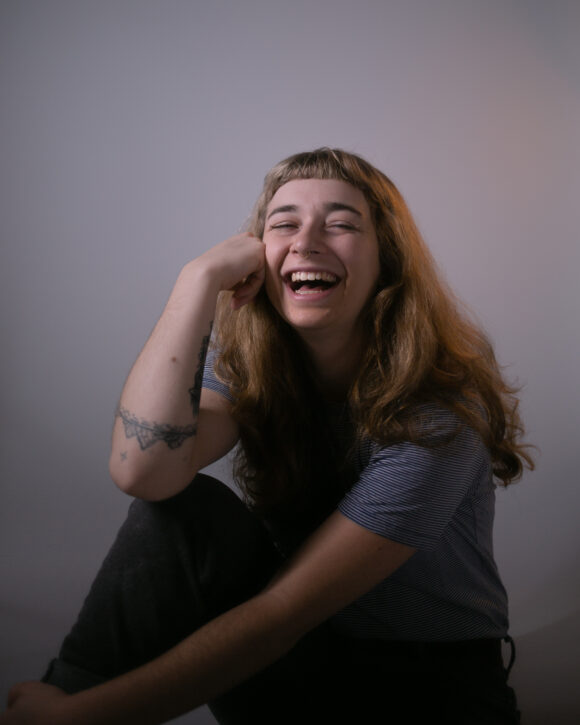
What is Clown as Protest?
CaP is a show that I am building for the CoHo Residency with some amazing fellow clowns. We are using this opportunity to experiment in how to utilize clowning as a tactic of both art and socio-political impact.
When and why did CaP Start?
I started with the CoHo Residency, in November/ December 2021, and I started because I have been trying to figure out how art and activism go together in a way that’s tangibly helpful, rather than theoretically helpful.
What kind of work does CaP do?
This iteration of CaP is building a structure that is hopefully reiterative to use clown to develop experiments in identity formation, with a specific emphasis on how class traitors are developed.
Can you tell us a bit about the show you’re putting together with CaP right now?
CaP is developing a choose-your-own-adventure type, build a boujie show, where we will develop a series of class traitor personalities that are associated with different objects. The audience will assign these objects to different clowns in order to see them put that personality on, and then mix and match the personalities to see how they impact each other.
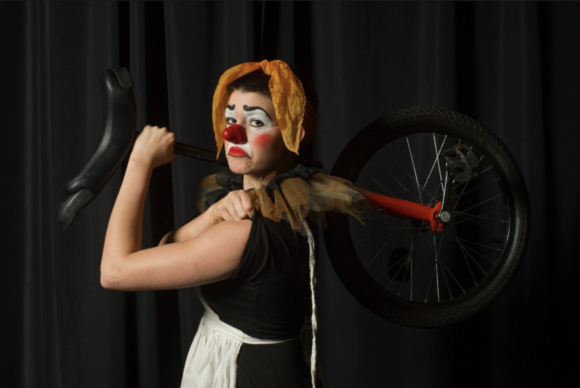
How did you decide on class traitors as a topic?
We wanted to use clown to investigate something that was ours to investigate. We decided early on that we did not want to clown any identity that we don’t belong to, and if we did want to clown an exploited or oppressed identity that we did belong to, we’d have to be really careful with that because we don’t want to trivialize that experience. Something that we could all relate to and have a relationship to is being in this global superpower place with access to some means, and having interactions with some people who are actively exploitative, to either us or people that have maybe less access to resources than we do. It felt like fair game, and it felt funny, and it felt cathartic.
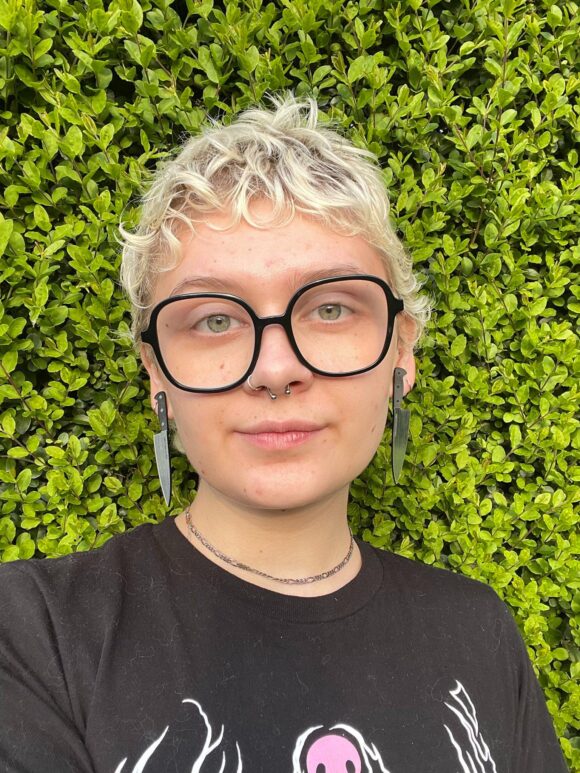
Tell us a bit about clown as an art form. What is traditional clowning?
It depends on where in the world you’re talking about, and when. The clowning I was taught in the United States was experimental, but based off of a theatrical form of physical comedy. The form trains you to communicate your performance and your experience as innocently as you can and as non-verbally as you can, allowing you to naturally create farce.
There’s also circus clowning, there’s french clowning, and then there’s also jester-esque figures in clowns that have been a part of a lot of indigenous societies, always, and across different social platforms that have served different purposes. There are also birthday clowns *cringe* Traditional clowning. But at its most boiled down, it is physical comedy that relies on the materialization of the actor’s innocence.
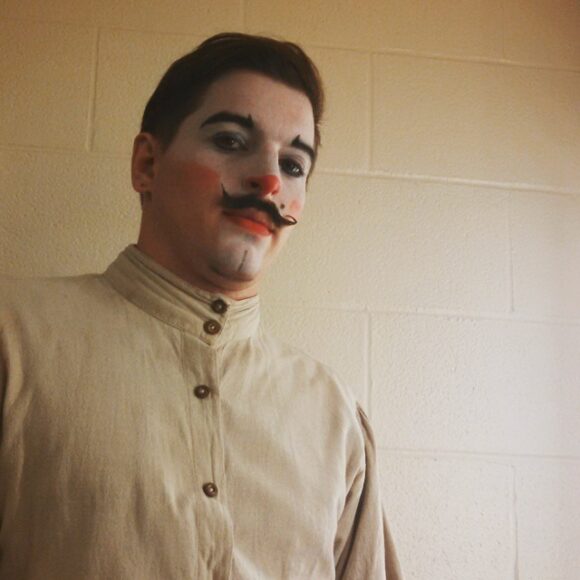
Does CaP focus on traditional clowning or is it more of a spin-off?
I think it’s much more of a spin-off. We use tools of traditional clowning, like takes, movement, duration, and props as they are useful to us. But because we’re trying to achieve such a specific end, I think that the way that we’re using clown leaves a lot of room for experimentation and adaptation.
Can you tell us a little bit about the clown that you’re developing? Are you developing one clown in particular or a series of clowns?
We have three clowns and one clown facilitator so far. We know that one of the clowns is going to be an ego-driven, potentially politician clown, and another one will be a scarcity mindset, maybe an economy-minded clown. So, hoarding tendencies on both of these clowns, but one for status and one for material wealth. We have two other clowns that we’re working on, one that we will choose, and then we have to develop the lead clown who will hold space for them.

So you’re using props to define the characters. What other technical elements are you using on stage?
So that’s something that we’re definitely still trying to figure out. We have a showing coming up where we’ll start to pick some of that apart with Phil, the Programming Director, at CoHo. I imagine I want it to be really over the top, so I want there to be sound cues that help the audience… I almost want there to be a laugh track and BOOO HIIISSSS sounds, kind of what you’d expect a circus audience to be giving. Like, a drunken circus audience. The more we can have these clowns take on that rambunctious, theatrical nature, the more that they’ll be in a liminal space that we can relate to without feeling intimidated by that relation. I want it to be theatrical, I want there to be the lights and the costumes and the makeup so that it is out of place, that it is out of this world. So that we can use it to get deeper into our day-to-day experiences.
Of all the things, what is your favorite part of CaP?
The peopleeeee! We just have such good guys in there! Our troop is just a crew of folx who really give a shit about the world and each other and themselves. We had this rehearsal the other week where someone said, “I’m just out, I’m out of spoons. I have no more capacity.” And then everybody was like, “FUCK. YEAH.” One by one, everyone else was like, “I also really can’t.” Let’s take a day off. Let’s just not. And it was just celebrated. And of course, it’s artists who are able to have the theory, actively we have this theory because we are making this show about how we should treat each other better, and then we should also put it into practice right away, so that’s really hopeful.
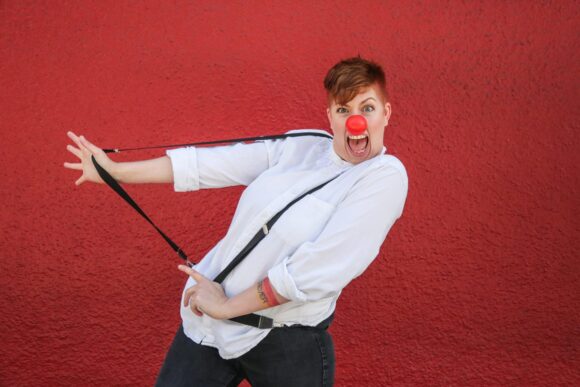
How do you think the audience will react to this piece?
Hopefully, they will be able to see something of themselves in these clowns, because we do. We made them out of ourselves, so hopefully it can be a moment of community reflection in a way that’s still hopefully harsh, but digestible, blunt, but also funny, because it’s absurd. The whole thing that we do every day where we put on our performance of status and then we go confirm the access we have to resources and mobility, like, it’s just… it’s crazy. So hopefully we can make it seem crazy enough that people who watch it can be there with us and have a bit of an interruption.
What do you want audiences to take away?
I hope that audiences take away an ability to use humor to look at this stuff in a way that’s more personal, not to trivialize it and not to diminish it, but to make it something you can look at and understand that it’s US, it’s not all of us, but there’s going to be a good amount of people in our audience who absolutely resonate with these clowns in certain aspects and… that’s important work. That’s really important work. I just want to support them breaking that down.
base copy
CLICK HERE to learn more about the 2022 CoHo Residents, and book your tickets to Clown as Protest! The show will be performed live at the CoHo Theatre May 27, 28, and 29th from 7–8 PM.




